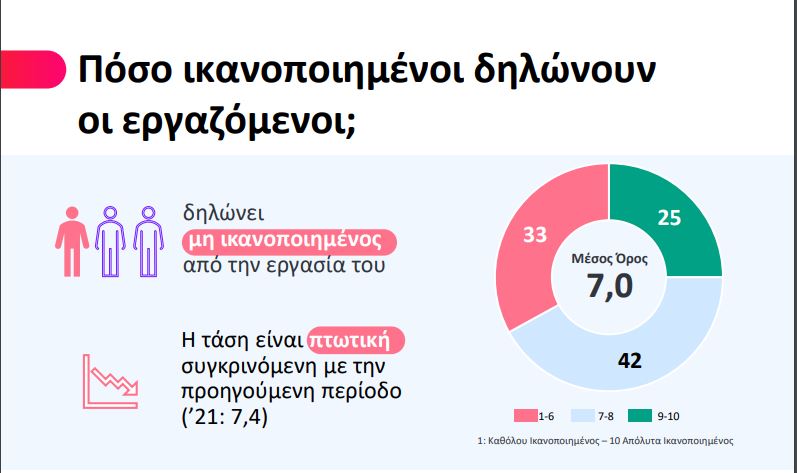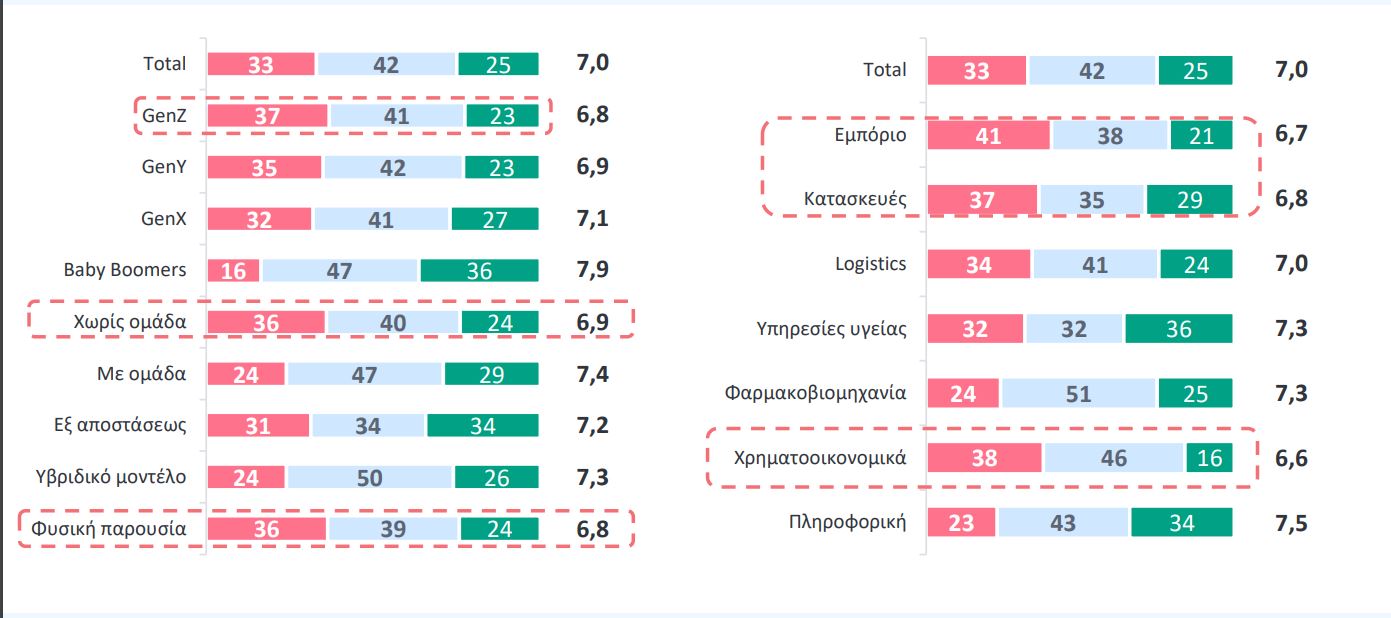Work Satisfaction: Unhappy with his work one in three

Greece is doing with Bulgaria in Eurostat's surveys, not only in the indicators of their wages And the purchasing power, but also in work satisfaction. In the map posted by the Commission's statistical service with the most and less satisfied workers, Greece occupies the penultimate position.
At the same time, a new study conducted in Greece by Edenred and Focusbari shows that labor satisfaction in our country is constantly declining. Only one in four (25%) say they are satisfied with his job, while one in three (33%) say « not at all satisfied ». The remaining 44% move in the gray zone of « Oh so ».
In 2023, The Average Job Satisfaction Rating in the EU WAS 7.4 on a Scale from 0 to 10.
Highest in:
cyprus, Romania and finland (all 7.9)
Lowest in:
bulgaria (6.2)
greece (6.8)
Learn More https://t.co/cqzck2zdlr pic.twitter.com/hfnuyhsb8l
– eu_eurostat (@eu_eurostat) February 26, 2025
What does Eurostat show
Eurostat's data on labor satisfaction has been drawn from the latest surveys of the living conditions of the National Statistics of 2024 (for the financial year 2023). To the question « How satisfied are you from your job? » On a scale from scratch (completely unhappy) to ten (completely satisfied), employees in Greece are « self -evaluated » on average 6.8 and in Bulgaria with 6.2. These are the only EU countries that fall below the psychological threshold of 7 and are « dyed » in yellow, while Turkey is ranked in the same category.
In all EU countries, the degree of work satisfaction is increasing according to the educational level, but in Greece the largest gap is observed. For example, compulsory education graduates are slightly satisfied with their work (6.1), while higher education graduates are very close to the average of the eurozone with 7.3.
Double -thrown young people
Another major deviation from Greece from the European average concerns new workers, 20 to 24 years. They are also in the penultimate position of the EU, after Bulgaria, with 6.5. At the same time, however, it is also worse than all other age categories in Greece. On the contrary, the twenty -two Europe enjoy the same degree of work satisfaction as the older workers (7.3).
This gap explains to some extent the causes of Brain Drain, but also how young people are more affected by low wages, job insecurity and high unemployment.
Source: Employee Experience Pulse 2024 (Edenred – Focusbari)
Unhappy with his work one in three
Eurostat statistics are confirmed by the latest research « Employee Experience Pulse », on work reality in Greece in 2024. The survey, conducted under the auspices of the Hellenic Resources Management Association (SDAD) last September, captures the degree of employees. At the same time it analyzes the causes of work satisfaction or dissatisfaction. The survey sample consists of 2,413 private sector workers and 179 HR executives. The answers cover a wide range of companies in size, industry and working model, and a variety of employee profile, in age, position, marital status, etc.
In Greece, one in three employees declares unsatisfied with his work, while at younger ages and those who work with a physical presence the percentage is higher. Numerous factors have either positively or negatively affecting employees' satisfaction. Among the main ones are wage earnings, evolution opportunities, climate at work and support from the boss. Four out of ten companies count their employees' satisfaction annually, but the majority of employees believe that the results of their company are not used to make decisions and actions.

Work Satisfaction per Branch and Age – Source: Employee Experience Pulse 2024 (Edenred – Focusbari)
Every last year and better
Work satisfaction in Greece is down from year to year. Compared to Focus Bari's previous survey of 2021. The percentages of employees who are satisfied with their work have been significantly reduced, with the average of average satisfaction ranging to 7.4 (on a scale of 1 to 10).
Research analysts attribute the reduction of labor satisfaction on the one hand in the inflationary crisis, which has « rocking » the purchasing power of wages and on the increased demands of workers after opening the labor market.
The lowest rates of work satisfaction are observed in sectors such as trade, construction and finance.
The generation of Baby Boomers, who are approaching pension or are workers-pensioners, are the most satisfied with their work, with an average of 7.9. Gen Z young people are the least satisfied, with just 6.8.
Causes of dissatisfaction
Of those who said they were unsatisfied with their work, almost seven in ten (67%) report as a major cause of low wage earnings. This phenomenon is more intense in telecommunications and financial workers.
40% report as a cause of displeasure the lack of occupational development opportunities and 31% the negative work climate. A significant percentage (27%) links lack of work satisfaction with the lack of balance of professional and personal life – a trend that is more evident in trade workers.
In contrast, for those who said satisfied, the most important factor is the positive climate in the workplace, with 42% – marginally over payroll earnings (41%). Employees in multinational companies are more likely to report good earnings as a key factor in employment satisfaction (45%).
For more than one in three (34%) work satisfaction is linked to the object itself. For Genz young people, enjoying the work they do and be able to apply their talents is even more important, with 46% referring to it as a major cause of work satisfaction.
Source: In








